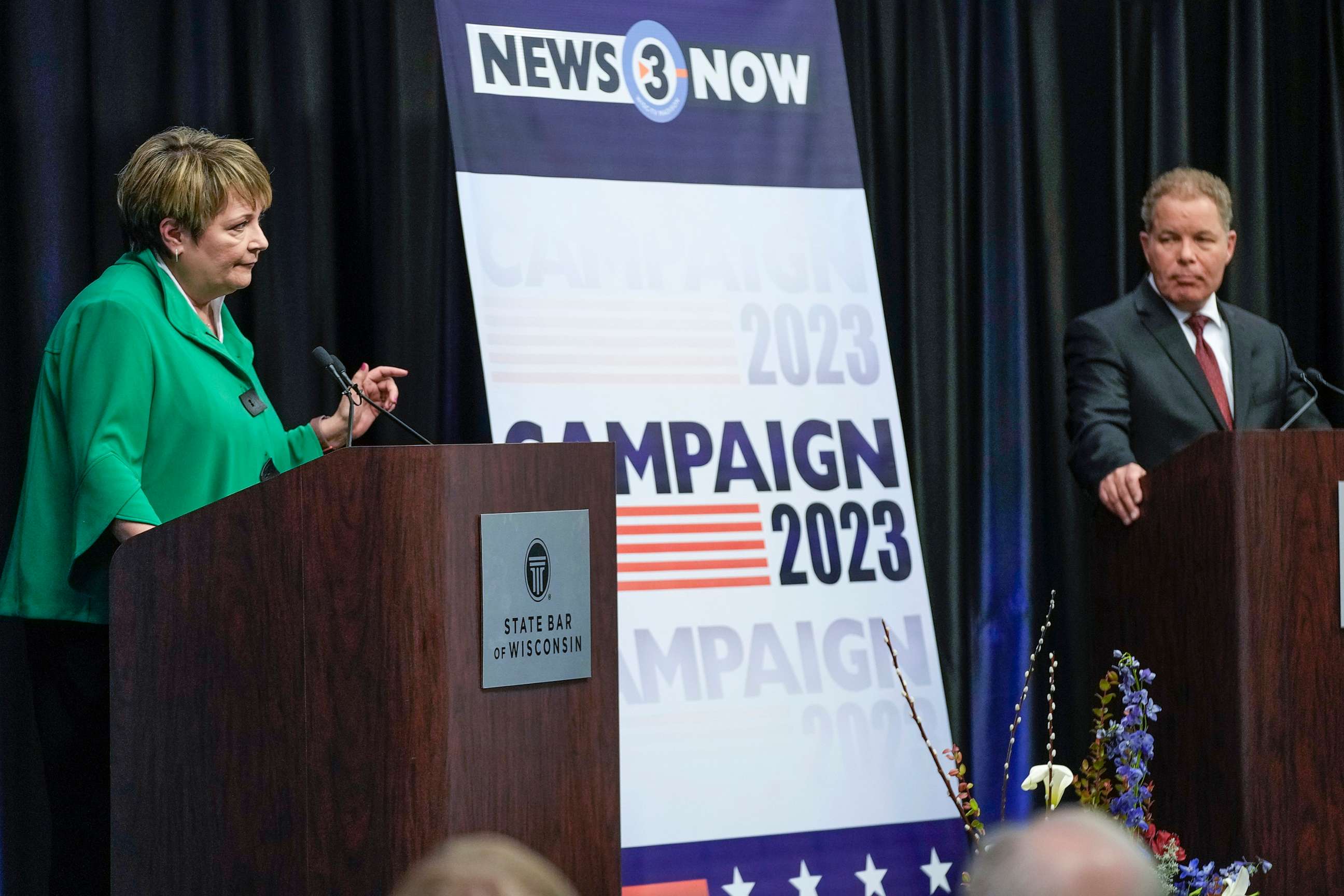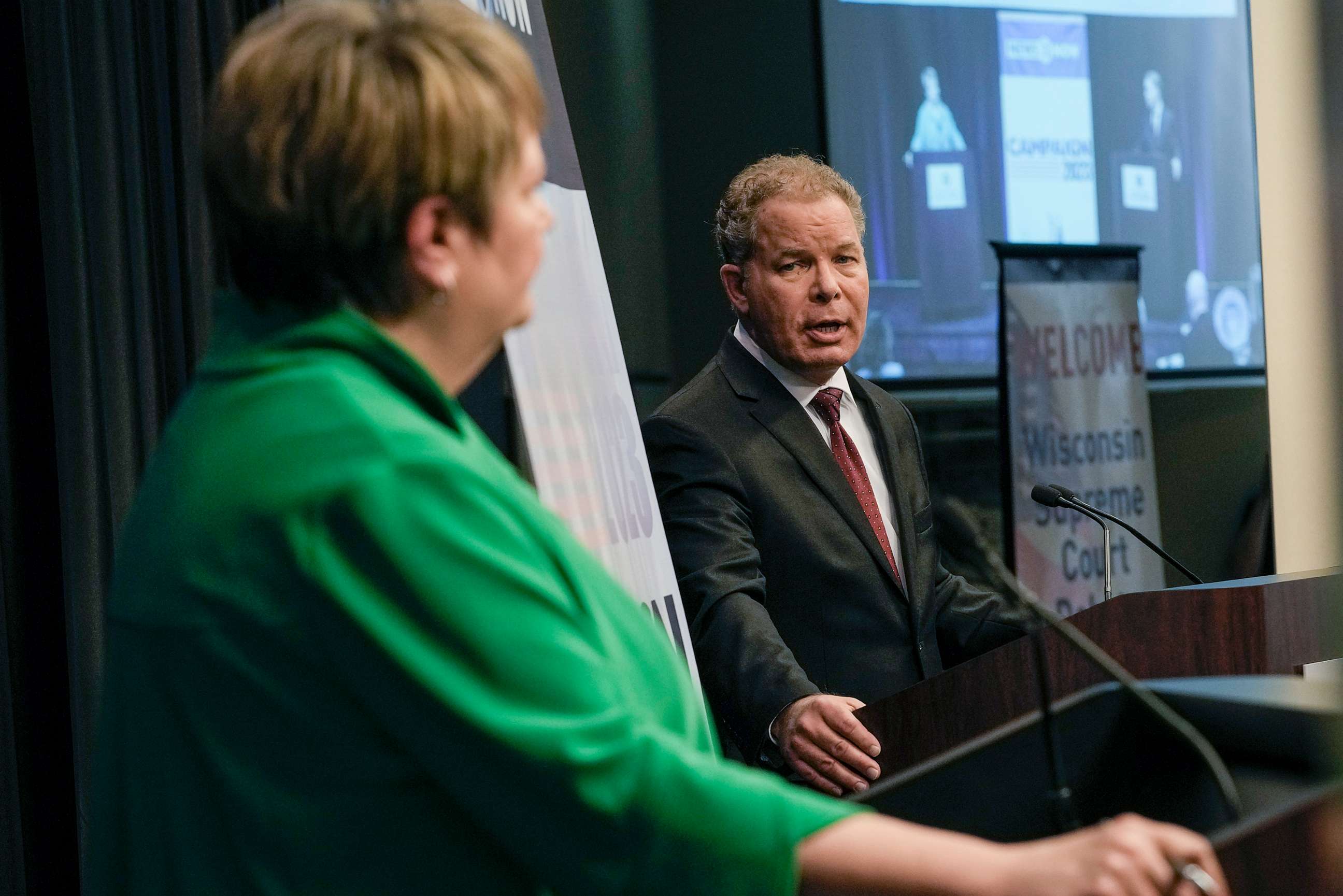Wisconsin Supreme Court candidates debate abortion access, gerrymandering
The two candidates in Wisconsin's crucial Supreme Court race met for their only debate Tuesday, debating hot-button issues such as abortion access and gerrymandering two weeks before voters will decide the balance of the state's highest court.
Milwaukee County Circuit Judge Janet Protasiewicz, a liberal judge, and former Wisconsin Supreme Court Justice Daniel Kelly, a conservative, sparred for nearly an hour at the Wisconsin Bar Association, dinging each other over trustworthiness and policy in the race to win a 10-year term.
Protasiewicz cast Kelly as a "true threat to our democracy," while Kelly repeatedly responded by painting his liberal opponent as a liar, with both citing ties to their partisan affiliations. The race is formally nonpartisan, but the two candidates' résumés and comments cast little doubt as to their ideological makeups.
Join FiveThirtyEight for their live coverage of the Wisconsin Supreme Court election results as they come in on the night of April 4.
Protasiewicz highlighted Kelly's track record of working with state GOP officials in an attempt to submit pro-Trump electors after the 2020 election even though then-candidate Joe Biden won the state.
"I am running against probably one of the most extreme partisan characters in the history of the state. This is somebody who advised the Republican Party on the fake elector scheme," Protasiewicz said. Kelly accused Protasiewicz of lying about his role in that effort.
The former state Supreme Court justice, meanwhile, accused his opponent of being "bought and paid for" by the state's Democratic Party and suggested she would have a "major problem going forward" if she were elected. Protasiewicz said she would recuse herself from any cases involving the state Democratic Party due to the support it has given her campaign.
Kelly did use the Republican Party of Wisconsin's offices as his campaign headquarters in his 2020 campaign to stay on the court, but he said he would not accept any money from the state party.
The two also took aim at each other over comments on abortion and outside groups involved in the issue, with each accusing the other of forecasting how he or she would rule on an 1849 abortion law still technically on the books that bans the procedure in virtually all instances.

Protasiewicz, while acknowledging being an abortion rights supporter, said she would decide a case about the ban based on the law not her personal beliefs.
"I have been very clear about my values to the electorate because I think the electorate deserves to know what a person's values are, Rather than hiding, I think the electorate deserve to know. I've also been very clear that any decision that I render will be made based solely on the law and the Constitution," she said.
"My personal opinion is that it should be a women's right to make a reproductive health decision, period," she added.
Protasiewicz also noted Kelly's endorsement from Wisconsin Right To Life, a group that opposes abortion rights, though Kelly said he did not make any promises to the group on how he'd rule.
"The conversations we had were this: Will you pledge to follow the law? Will you uphold the Constitution? Will you do the job of the justice and simply using existing law to decide the case has to come before the court? And that's the same pledge I made to everyone, regardless of the issue involved that might come before the court. And so, they can be confident -- just like everyone else in the state -- that decisions would be based on the law," Kelly shot back.

Protasiewicz and Kelly also tangled over the state's legislative lines, with Protasiewicz claiming the current maps are rigged in Republicans' favor and Kelly accusing her again of forecasting a future ruling from the debate stage.
"So, we know that the maps are not fair. We have battleground elections. We know they're not. But the question is, am I able to fairly make a decision on a case? Of course I would. … That's what you do. I can assure you that every single case that I will ever handle will be rooted in the law 100%," Protasiewicz said.
"See, this is a problem that you have when you have a candidate who does nothing but talk about her personal politics," Kelly responded. "She's already told each and every one of you how she will approach this. And although she says the formulaic words that she will follow the law, she's never said one thing in this campaign that would lead to any reasonable belief that that's what she will do."
The stakes are high for the April 4 faceoff between the two. The seven-member Supreme Court, currently split 4-3 in conservatives' favor, would flip if Protasiewicz replaced retiring Justice Patience Roggensack, a conservative.
Besides ruling on issues like abortion rights and gerrymandering, the court could become involved in a close presidential election, as was the case when it intervened in 2020 to shut down an effort by former President Donald Trump to overturn his narrow loss in the state.




